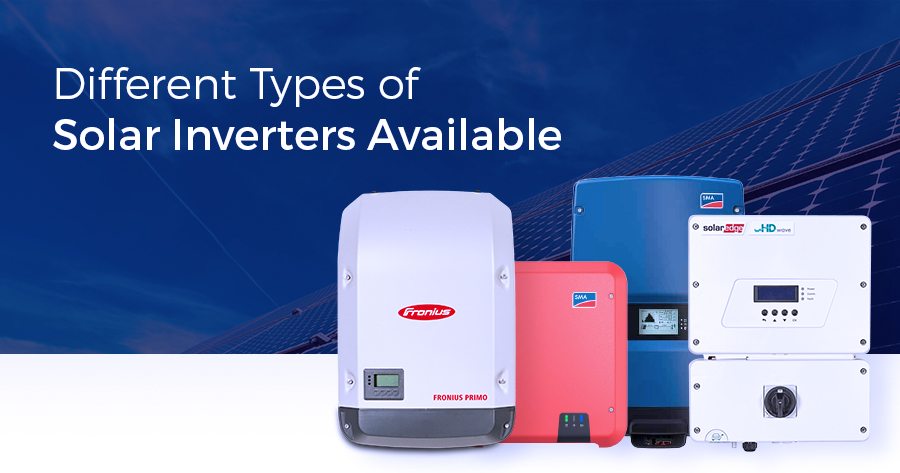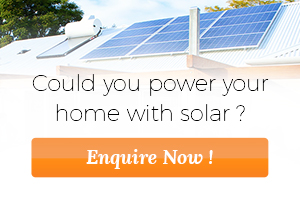Different Types of Solar Inverters Available

The solar inverter lies at the heart of your system. This sophisticated piece of electrical equipment is responsible for:
- The conversion of DC electricity (produced by the solar panels) to AC electricity which can be used within your home or exported to the grid.
- Controlling the voltage of the system to extract the maximum power available (referred to as maximum power point tracking).
- Reporting on the solar system’s performance (either on screen, via bluetooth or the internet).
While different inverter products may have unique features and characteristics, they must convert the DC to AC in order to be considered an inverter.
This blog will explore the different types of inverters available, and the pros and cons of each kind.
Standard String Inverters
About
The most frequently installed inverter type in Australia, standard string inverters are installed in both residential and commercial installations. In this type of set up, the DC electricity generated by your solar panels is directed into this central inverter, which completes the conversion into AC electricity.
Pros
With hundreds of CEC approved string inverters available in Australia, it’s easy to find an inverter to suit your home or business’s particular needs and budget.
Plus, with literally millions of solar PV systems around the world featuring string inverters, the technology is proven, dependable and efficient.
Cons
Because a standard string inverter does not allow for battery integration, if you want to install a solar battery you’ll need to invest in a separate battery inverter. This means additional costs and componentry.
Micro-inverters
About
Compared to standard string inverters, micro-inverters are much smaller in both physical size and capacity, ranging from just 200 to 250W.
Unlike a standard inverter that converts all the DC electricity your panels collectively produce, a single micro-inverter is installed on the back of every individual panel in your system. These micro-inverters perform the same function as a standard string inverter (conversion of DC power to AC power), negating the need for a standard inverter.
Pros
Solar PV systems utilising micro-inverters usually perform better than standard string inverter systems. As every panels output is converted separately, underperforming panels (whether due to shading or degradation) do not negatively impact the output of other panels.
Micro-inverters also allow you to monitor the performance of individual solar panels.
Cons
At double to three times the cost of standard string inverters, micro-inverters do not come cheap. As they only typically exceed a string inverters performance by 6 to 8%, often the cost savings do not make up for the initial increased outlay.
Plus, because they sit on the roof with your panels, they are more susceptible to extreme weather conditions.
Micro optimisers present an alternative to micro-inverters that deliver almost identical benefits at a much more affordable price.
Battery Inverters
About
Responsible for the charging and discharging of the solar electricity stored in a battery system, battery inverters are often installed alongside a standard string inverter, which it will AC couple or “talk” with.
Pros
Thanks to a plenty of R&D investment and history similar to standard string inverters, battery inverters are often robust and hard-wearing.
Thanks to AC coupling, battery inverters can often be physically retrofitted simply and efficiently into existing solar PV systems.
Cons
Although reliant on your state or territory’s Network Operator, the rules surrounding retrofitting battery inverters can sometimes be complex and expensive, even though the physical process may be simple.
Plus, retrofitting a battery inverter will usually cost more than installing a hybrid inverter when you initially purchase your system.
Hybrid Inverters
About
Performing the same function as standard string inverters and battery inverters, hybrid inverters convert the DC electricity your panels generate into AC electricity your home can use, in addition to charging and discharging your solar battery bank.
Pros
Purchasing a hybrid inverter is a more affordable and easier solution than installing both a standard string and battery inverter.
Plus, because the majority of hybrid inverters can be installed without a battery, purchasing a hybrid inverter gives you the flexibility to retrofit a solar battery at a later date.
Cons
Because a hybrid inverter is tasked with undertaking two integral functions, they can be less efficient than separate standard string and battery inverters.
Off-Grid Inverters
About
Just like standard string inverters that are connected to the grid, off-grid inverters are responsible for the conversion of DC electricity into AC electricity.
Unlike standard string inverters however, they do not have the capacity to export excess solar electricity into the grid. This is why off-grid inverters are used in either remote areas, or where the home or business owner wants to separate from the grid completely.
Pros
By separating from the grid, an off-grid inverter system means your home or business is no longer susceptible to power outages caused by the grid, giving you greater energy independence.
Some off-grid inverters come with the bonus of a built-in AC charger option, giving you’re the ability to not only connect a backup generator, but also charge a battery storage system.
Cons
Deciding to separate from the grid can be incredibly costly and complicated. It can also be hard to undo, so you’ll need to consider the future implications of being disconnected including the re-sale value of your home and your future energy needs.
Infinite Energy stocks inverters from SMA, Fronius, and SolarEdge. We have chosen these brands as they are reputable manufacturers, dedicated to producing inverters of the highest quality and efficiency.
With over 10,000 installations to our name, Infinite Energy can help you decide which inverter type is right for your home or business. To request a no obligation callback, click here.


